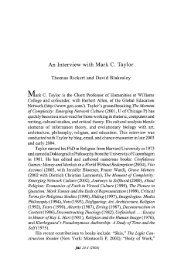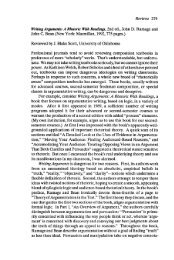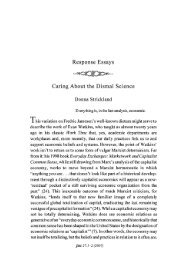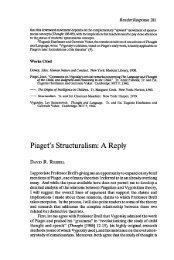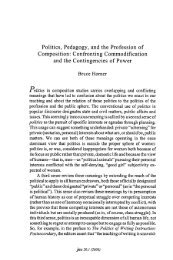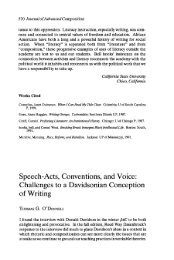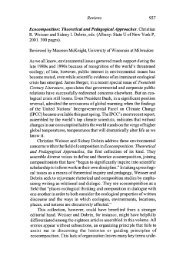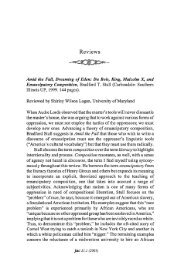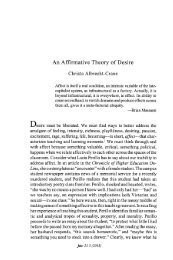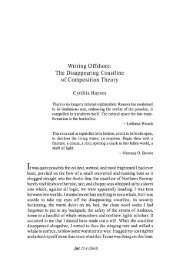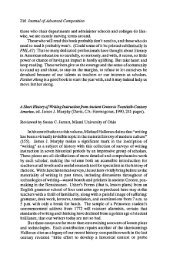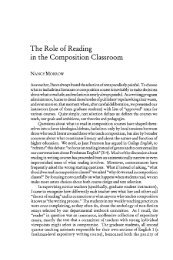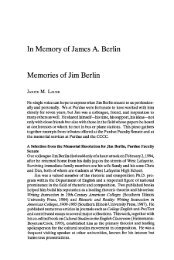Narrative Topic and the Contemporary Science Essay ... - JAC Online
Narrative Topic and the Contemporary Science Essay ... - JAC Online
Narrative Topic and the Contemporary Science Essay ... - JAC Online
You also want an ePaper? Increase the reach of your titles
YUMPU automatically turns print PDFs into web optimized ePapers that Google loves.
116 Journal of Advanced Composition<br />
nature. The starfish with its "dark, magnificent-lensed octopod eye"<br />
becomes <strong>the</strong> protagonist in Eiseley' s little story of creation. His purpose is to<br />
give readers a sense of what evolution <strong>and</strong> natural selection really mean: <strong>the</strong>y<br />
are not processes that can be simplified into searches for <strong>and</strong> arguments about<br />
proposed "missing links" or about whe<strong>the</strong>r humans were descendent from<br />
apes. For Eiseley, evolution <strong>and</strong> natural selection are processes that ought to<br />
lead to immense respect for nature's capabilities for change, adaptation, <strong>and</strong><br />
development over <strong>and</strong> through time <strong>and</strong> space. Humans are not simply<br />
descendent of o<strong>the</strong>r species or forms; <strong>the</strong>y are complex combinations of <strong>the</strong><br />
traits <strong>and</strong> characteristics of many past <strong>and</strong> present species. Starfish, fish, <strong>and</strong><br />
ape had all had <strong>the</strong>ir place in human phylogeny. Perhaps it is better, Eiseley<br />
suggests, to couch <strong>the</strong>se basic truths in dramatic form to communicate <strong>the</strong>ir<br />
full impact. Thus, Eiseley tells <strong>the</strong> complete story <strong>and</strong> <strong>the</strong>reby avoids<br />
oversimplified arguments about <strong>the</strong> implications of evolution <strong>and</strong> natural<br />
selection. By moving to narrati ve, Eiseley never leaves behind his emphasis<br />
on change <strong>and</strong> adaptability. These concepts become what Wolfgang Iser<br />
would call <strong>the</strong> <strong>the</strong>matic horizon behind each line <strong>and</strong> word in his text (96).<br />
Once Eiseley has introduced a scien tific principle-say, that of <strong>the</strong> essential<br />
variation of life through space <strong>and</strong> time-he looks around for concrete<br />
observations of <strong>the</strong> natural world that reinforce it. But simple descriptions of<br />
<strong>the</strong>se observations, whe<strong>the</strong>r of pigeons in New York or foxes in Nebraska, no<br />
matter how precisely recorded, never seem to satisfy Eiseley. Entries from<br />
his notebooks consistently demonstrate this disappointment with <strong>the</strong> conventions<br />
of deductive <strong>and</strong> inductive science writing. In <strong>the</strong> Lost Notebooks, for<br />
instance, Eiseley often assembles brief, concrete observations into a pattern<br />
leading to an inevitable deduction. A cluster of notes about pigeons appears<br />
in Lost Notebooks, on different pages. Yet, Eiseley never seems content, as<br />
would <strong>the</strong> typical science writer writing for specialized journals, with this<br />
straight-line journey from observation to principle <strong>and</strong> back again. Instead,<br />
<strong>the</strong> line of inference is broken by what we might call <strong>the</strong>" consciousness" of<br />
<strong>the</strong> working scientist, captured in <strong>the</strong> many reflective passages in Lost<br />
Notebooks. In fact, Eiseley' s notes on books or lectures that he is considering<br />
writing, which make up <strong>the</strong> greatest part of <strong>the</strong>se notebooks, are in essence<br />
occasions in which subjective consciousness interrupts <strong>the</strong> objective recordings<br />
of observations <strong>and</strong> <strong>the</strong> drawing of scientific conclusions.<br />
Eiseley describes <strong>the</strong> motives behind <strong>the</strong>se reflective intrusions in <strong>the</strong><br />
following passage, in which he defends his use of <strong>the</strong> "nature essay" genre.<br />
He begins by explaining how many political systems, particularly <strong>the</strong><br />
Russian, denigrate a writer's "deviation from <strong>the</strong> party line" by calling that<br />
writer a "mystic." Eiseley <strong>the</strong>n goes on to say,<br />
I cannot resist <strong>the</strong> observ ation that this name-calling ... occasionally emerges<br />
here in some few scientific quarters where <strong>the</strong>re is an unconscious attachment<br />
to an extremely materialistic world view similar to that which broods with



